
Far too many Indigenous women, girls and 2SLGBTQQIA+ people in Canada
become victims of violence. Although Indigenous women make up only four percent of Canada's female
population,
16 percent of all women murdered in Canada between 1980 and 2012 were Indigenous. In 2017, 24 percent of
female
homicide victims in Canada were Indigenous women and girls.
Stolen Sisters: A
Human Rights Response to Violence and Discrimination against Indigenous Women in Canada was
released by Amnesty International in 2004. The Sisters in Spirit Initiative, led by the Native Women's Association of Canada, was initiated to gather
important statistics and to raise awareness of this issue. As of 2010, 582 cases of missing or murdered
Indigenous women and girls were entered into the Sisters in Spirit database.
Many other reports and studies on violence
toward Indigenous women in Canada have identified some root causes, including poverty, homelessness, racism,
sexism, colonialism and the great harm caused by historic factors, such as the residential school
system.
Rates of domestic, family and stranger violence are extremely high. Indigenous women are more
likely to be killed by acquaintances than are non-Indigenous women. They are seven times more likely to be
targeted by serial killers. In the words of James Anaya, United Nations Special Rapporteur on the Rights of
Indigenous Peoples, the rates of missing and murdered Indigenous women and girls are
"epidemic".
2SLGBTQQIA+ refers to Two-Spirit, Lesbian, Gay,
Bisexual, Transgender, Queer, Questioning, Intersex or Asexual individuals, while the + stands
for other ways individuals may express their gender or sexuality.
Previous Messages
November 13, 2021, marked the 50th Anniversary since the tragic death of Helen Betty
Osborne, referred to
as Betty by her family and friends. Betty was a nineteen year old Cree woman from Norway
House
who
was
boarding in The Pas to attend high school. She was deeply loved by her family and had dreams
of
furthering
her education to become a teacher. On November 12, 1971, Betty did as many
nineteen-year-olds do
and
went
out with her friends. Instead of returning home, Betty was abducted by four non-Indigenous
men.
She
was
assaulted, attacked repeatedly, and brutally murdered. Charges were not laid until 1986,
sixteen
years
later, when only one of her attackers was convicted of her murder.
In 1988, the Manitoba Government created the Pubic Inquiry into the Administration of
Justice
and
Aboriginal People, commonly known as the Aboriginal Justice Inquiry. The Inquiry was created
partially
in
response to the trial of two of Betty’s attackers and allegations that the identities of all
four
men
were
widely known in the community shortly after her murder. The findings of the Inquiry
concluded
that
“It
is
clear that Betty Osborne would not have been killed if she had not been Aboriginal...those
who
abducted
her
showed a total lack of regard for her person or her rights as an individual.”
Although 50 years have passed, the epidemic of Missing and Murdered Indigenous Women,
Girls,
Men,
Boys,
Two-Spirited and Gender Diverse individuals continues to personally affect thousands of
families
across
Manitoba and Canada.
All Manitobans must remember Betty, alongside the many others, who unfortunately share a
similar
story.
It is imperative that we honour the life of Helen Betty Osborne by continuing to
acknowledge
the
factors
that led to this tragedy. These factors include the very real existence of both historic and
continued
forms
of colonialism, systemic racism, the ongoing and intergenerational effects of the
residential
school
system,
and the consistent devaluing of women over generations. The National Inquiry was clear that
this
pattern
represents genocide.
The Manitoba Government recognizes the magnitude of work that remains to be done, as well
as
our
role
in
addressing these harms. We will continue to work alongside and be guided by Indigenous
families,
survivors,
leadership, communities, and organizations.
______
If you or someone you know is in immediate danger, please call 911.
For additional supports, please see Trauma-Informed
Resources.
Additional Resources
Helen Betty Osborne Scholarship
The Aboriginal Justice Implementation Commission
Supports for Families of Missing and Murdered Indigenous Women and Girls
CBC Missing and Murdered
Crime Stoppers Missing and Murdered Indigenous Women
June 3, 2021 marked the second anniversary of the release of the Final Report of the
National
Inquiry
into
Missing and Murdered Indigenous Women and Girls. Manitoba, through the Gender-Based Violence
Committee
of
Cabinet (GBVCC), is committed to taking coordinated steps to end gender-based violence.
In the below video, hear how members of the GBVCC are working through their departments and alongside Indigenous women, girls, 2SLGBTQQIA+ people, families, survivors, leadership and communities to take action and promote a future where Indigenous women and girls can thrive in a safe and secure.
In the below video, hear how members of the GBVCC are working through their departments and alongside Indigenous women, girls, 2SLGBTQQIA+ people, families, survivors, leadership and communities to take action and promote a future where Indigenous women and girls can thrive in a safe and secure.
Help
If you are in immediate
danger, or feel unsafe, CALL 911.
If you or someone you know
is not in immediate danger, but needs advice, please call the 24-hour domestic violence
information and crisis line at 1-877-977-0007. The help line is available province-wide
where callers can find out about their options and services available in their
community.

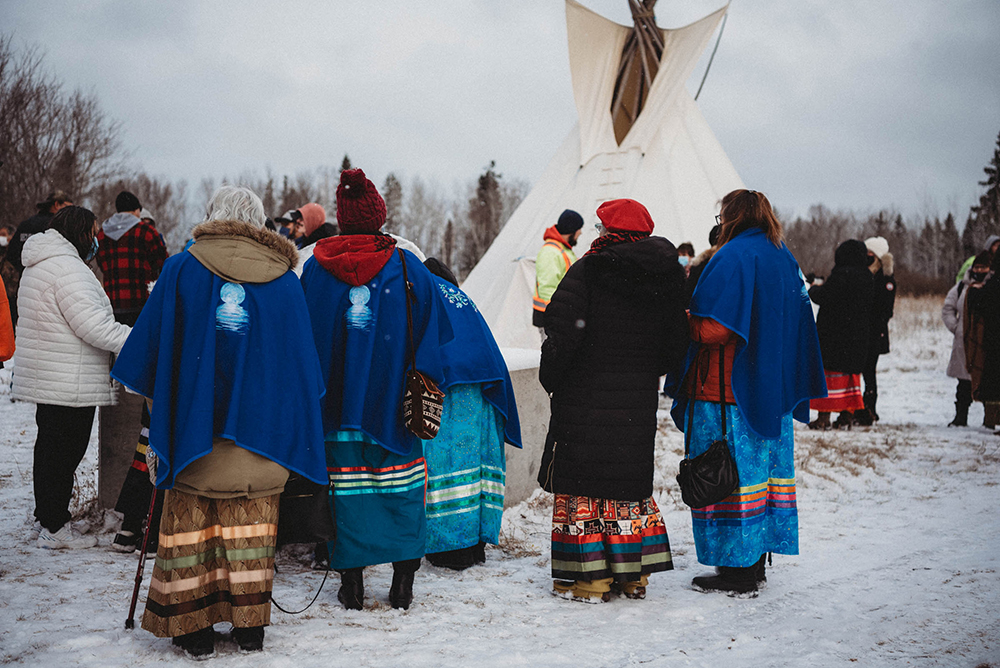 Over 200 people from all
across Manitoba gathered on the grounds of the former Guy Hill Residential School
Site north of The Pas, Manitoba to honour the life and legacy of Helen Betty
Osborne. Attendees included family and friends, advocates, and politicians. (Credit:
B. Bloxom; The Pas Family Resource Centre).
Over 200 people from all
across Manitoba gathered on the grounds of the former Guy Hill Residential School
Site north of The Pas, Manitoba to honour the life and legacy of Helen Betty
Osborne. Attendees included family and friends, advocates, and politicians. (Credit:
B. Bloxom; The Pas Family Resource Centre).
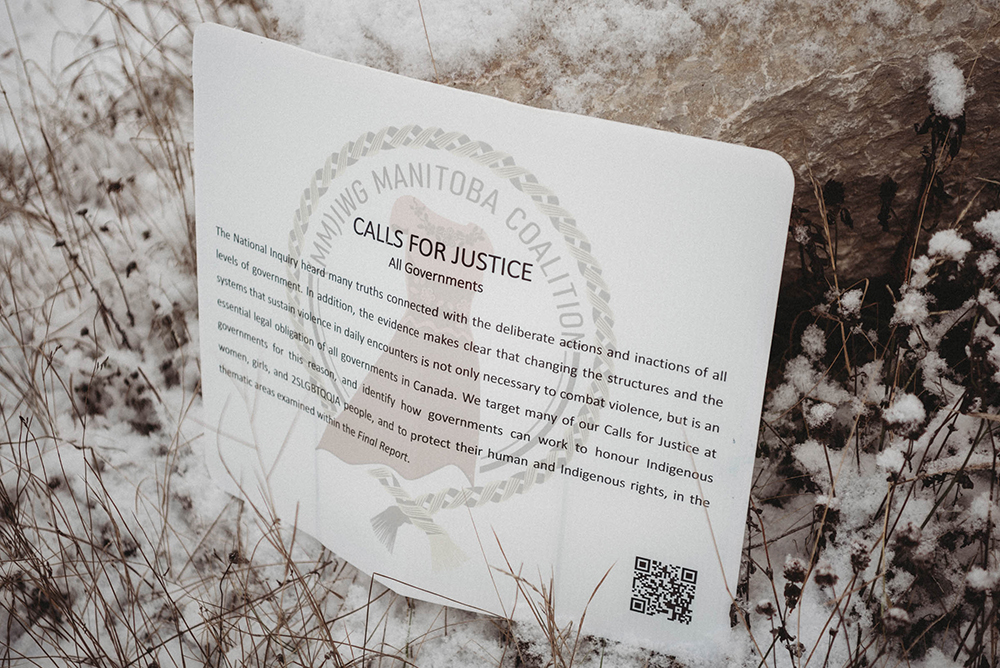 Each of the 231 Calls for
Justice was printed and placed along the memorial route for the 50th Anniversary
Commemoration for Helen Betty Osborne. (Credit: B. Bloxom; The Pas Family Resource
Centre).
Each of the 231 Calls for
Justice was printed and placed along the memorial route for the 50th Anniversary
Commemoration for Helen Betty Osborne. (Credit: B. Bloxom; The Pas Family Resource
Centre).
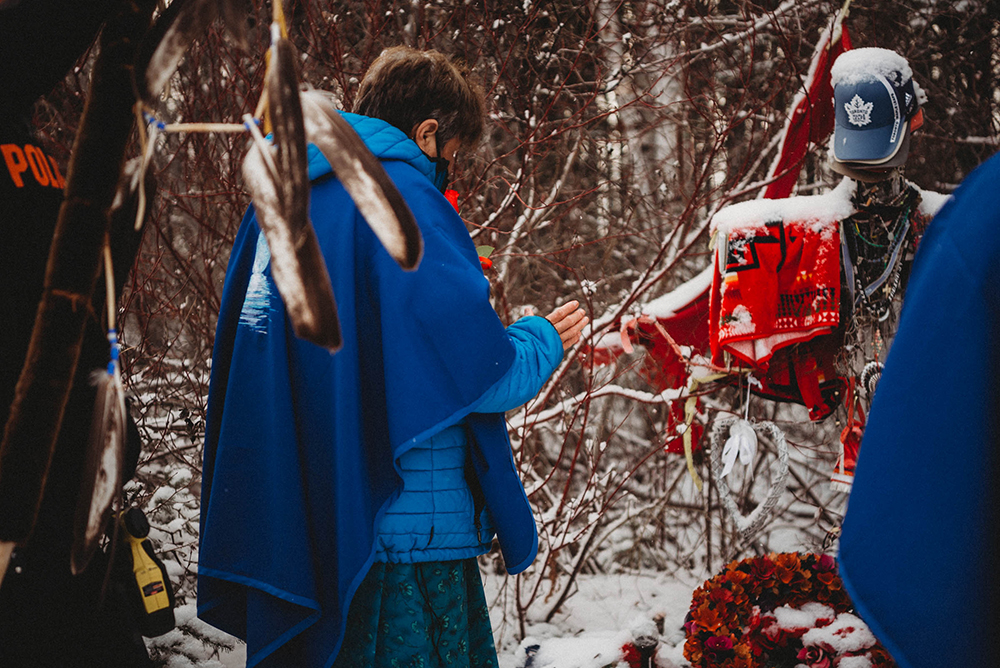 Following the ceremony at the
Guy Hill site, memorial participants walked four kilometres to the pump house to lay
a wreath, flowers, and tobacco at the memorial built in honour of Helen Betty
Osborne. (Credit: B. Bloxom; The Pas Family Resource Centre).
Following the ceremony at the
Guy Hill site, memorial participants walked four kilometres to the pump house to lay
a wreath, flowers, and tobacco at the memorial built in honour of Helen Betty
Osborne. (Credit: B. Bloxom; The Pas Family Resource Centre).
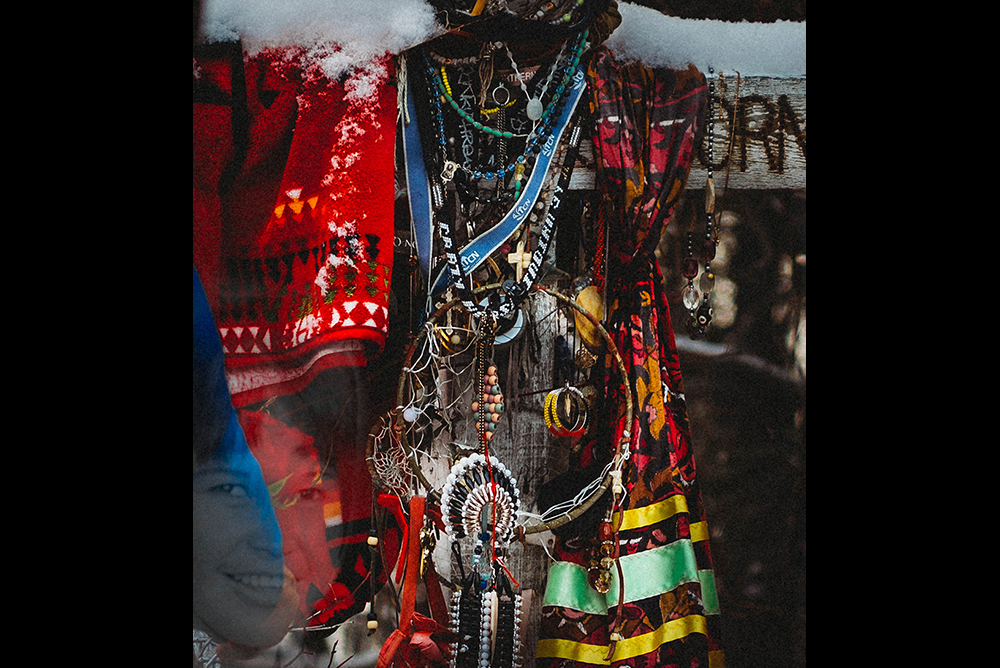 View of the memorial built in
honour of Helen Betty Osborne. (Credit: B. Bloxom; The Pas Family Resource Centre).
View of the memorial built in
honour of Helen Betty Osborne. (Credit: B. Bloxom; The Pas Family Resource Centre).
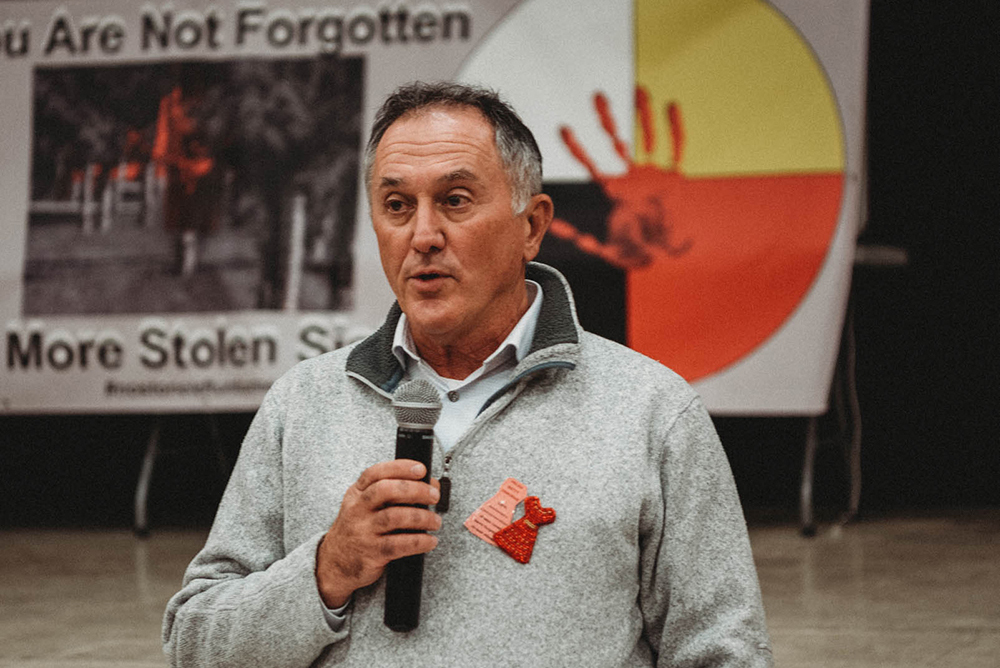 Minister Alan Lagimodiere
delivering remarks at the 50th Anniversary Commemoration for Helen Betty Osborne on
November 13, 2021. (Credit: B. Bloxom; The Pas Family Resource Centre).
Minister Alan Lagimodiere
delivering remarks at the 50th Anniversary Commemoration for Helen Betty Osborne on
November 13, 2021. (Credit: B. Bloxom; The Pas Family Resource Centre).
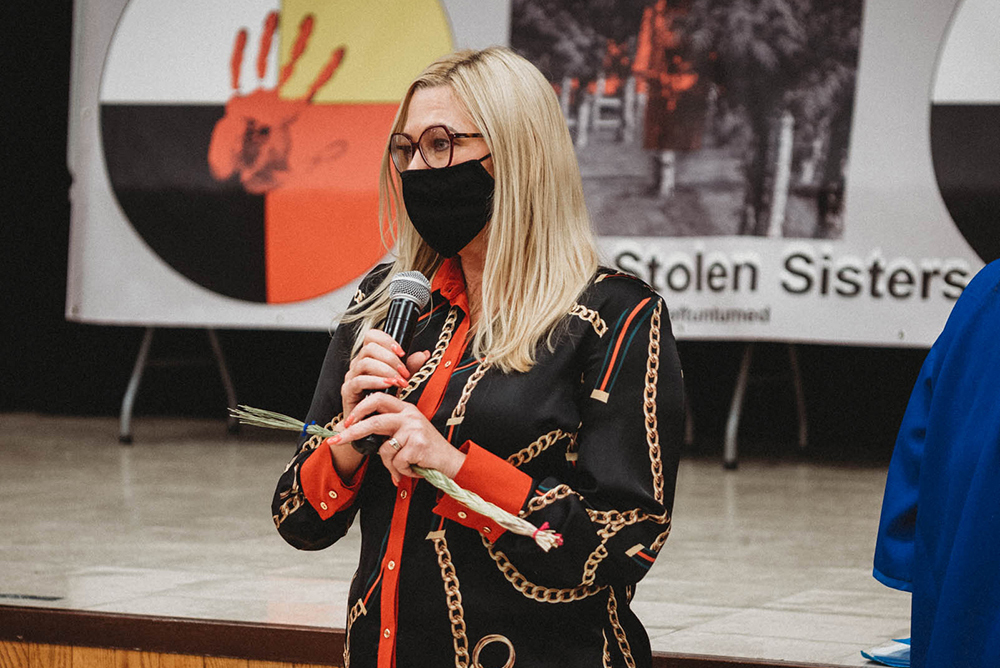 Minister Rochelle Squires
delivering remarks at the 50th Anniversary Commemoration for Helen Betty Osborne on
November 13, 2021. (Credit: B. Bloxom; The Pas Family Resource Centre).
Minister Rochelle Squires
delivering remarks at the 50th Anniversary Commemoration for Helen Betty Osborne on
November 13, 2021. (Credit: B. Bloxom; The Pas Family Resource Centre).
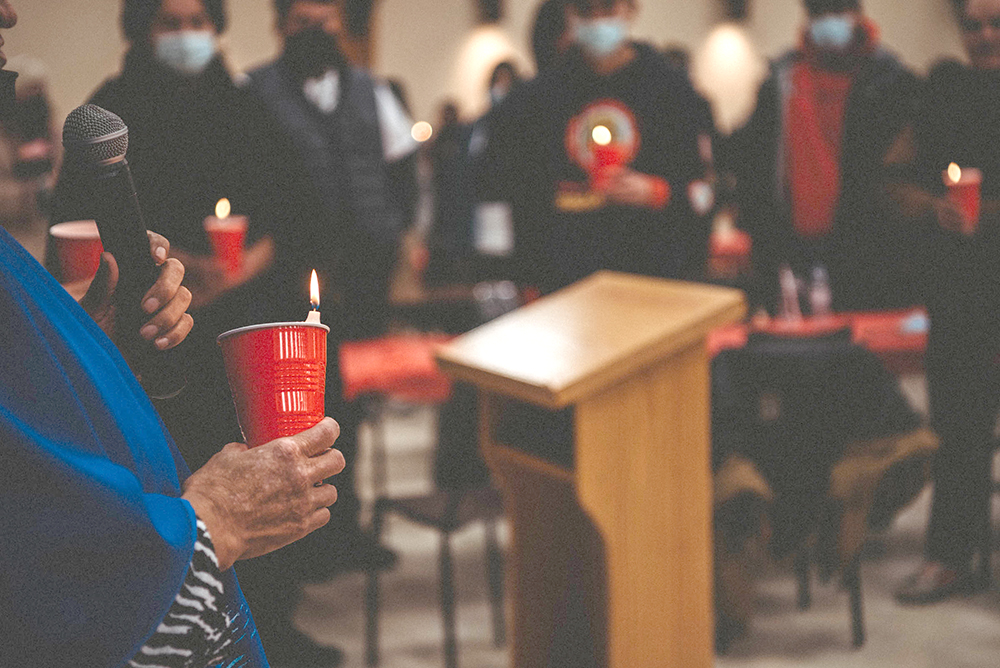 View of the Candlelit Ceremony
held at the end of the 50th Anniversary Commemoration for Helen Betty Osborne on
November 13, 2021. (Credit: B. Bloxom; The Pas Family Resource Centre).
View of the Candlelit Ceremony
held at the end of the 50th Anniversary Commemoration for Helen Betty Osborne on
November 13, 2021. (Credit: B. Bloxom; The Pas Family Resource Centre).
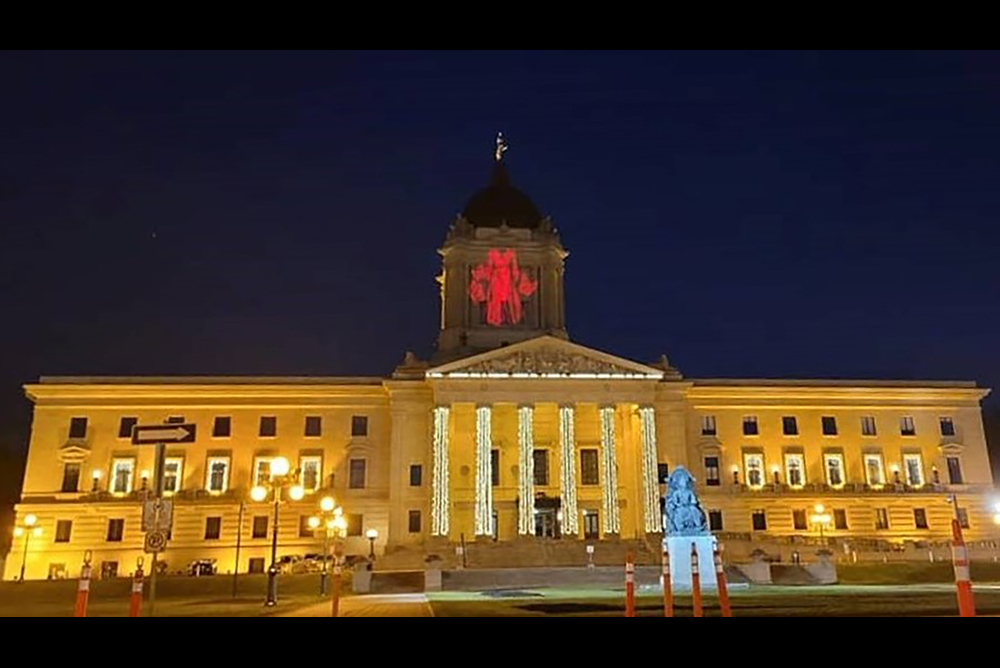 View of the red
dress display at the Legislative Building in recognition of MMIWG Awareness Day,
October 2021.
View of the red
dress display at the Legislative Building in recognition of MMIWG Awareness Day,
October 2021.
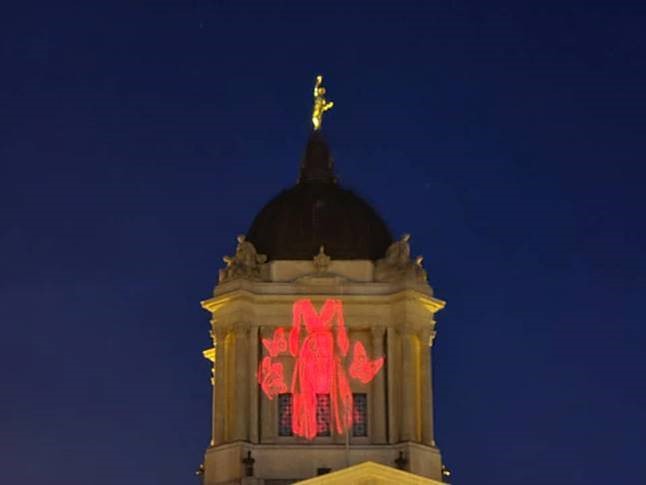 Close-up view of the
red dress display at the Legislative Building.
Close-up view of the
red dress display at the Legislative Building.
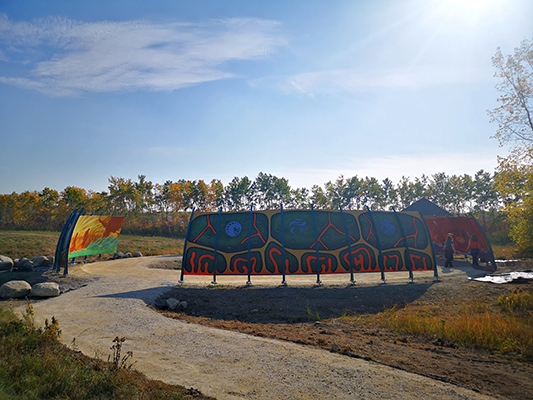 Unveiling of
Manidoonsag Imaa Mikinaako-Minisiing in Selkirk on MMIWG Awareness Day, October 4,
2021.
Unveiling of
Manidoonsag Imaa Mikinaako-Minisiing in Selkirk on MMIWG Awareness Day, October 4,
2021.
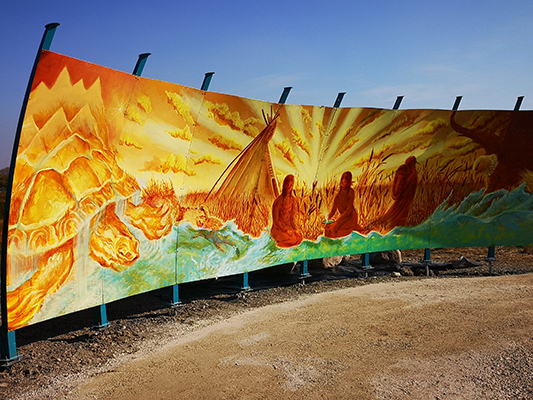 One of four murals
in the Manidoonsag Imaa Mikinaako-Minisiing installation in Selkirk, Manitoba.
One of four murals
in the Manidoonsag Imaa Mikinaako-Minisiing installation in Selkirk, Manitoba.
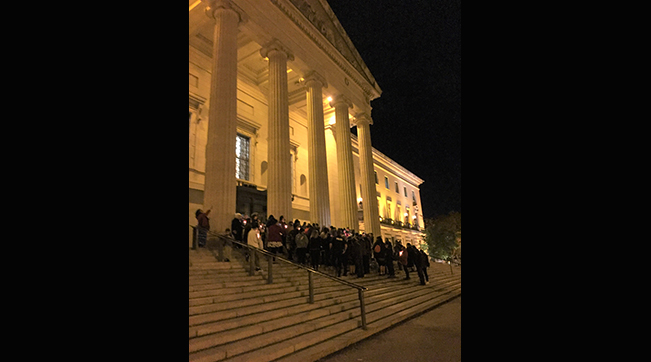 Manitoba MMIWG Awarness
Day Vigil – October 4, 2018
Manitoba MMIWG Awarness
Day Vigil – October 4, 2018
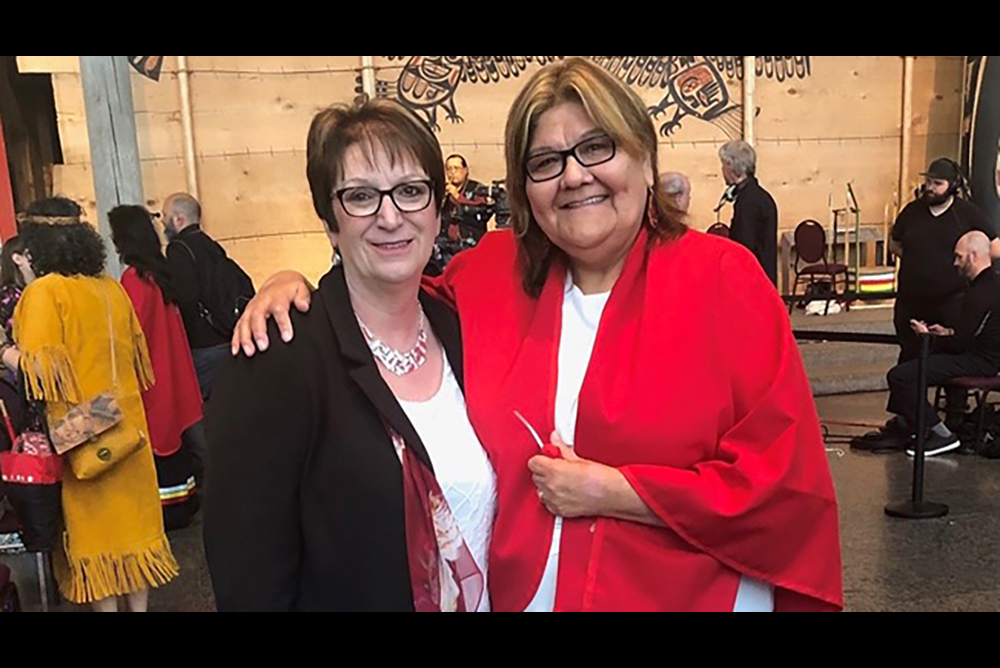 Minister Eileen
Clarke with MMIWG Family Member Darlene Osborne from Norway House Cree Nation
Minister Eileen
Clarke with MMIWG Family Member Darlene Osborne from Norway House Cree Nation
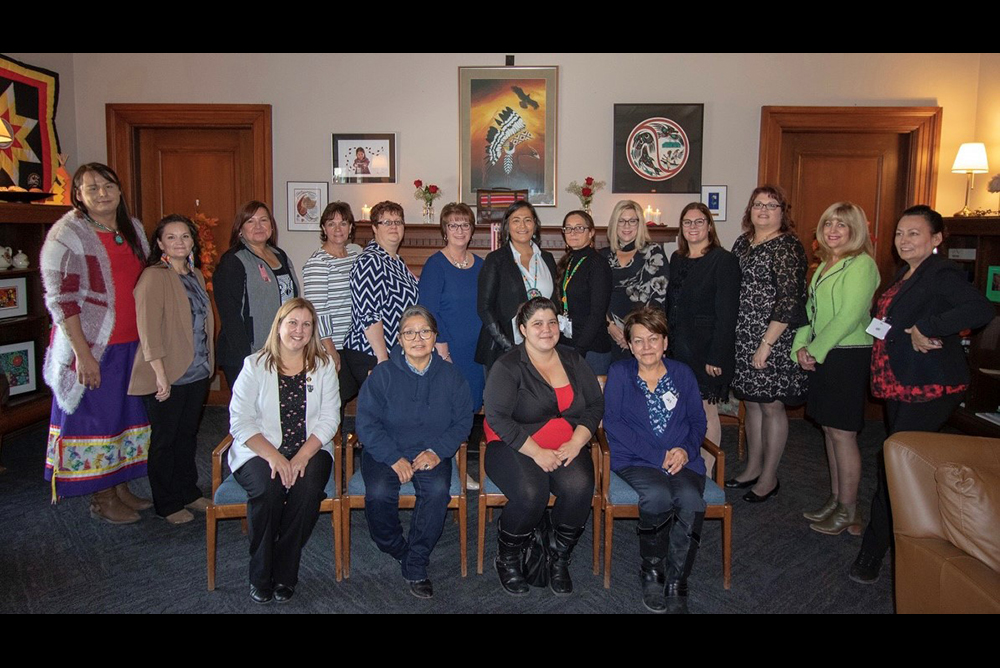 MMIWG National Inquiry
Commissioner Michèle Audette visit to the Manitoba legislature – 2018
MMIWG National Inquiry
Commissioner Michèle Audette visit to the Manitoba legislature – 2018
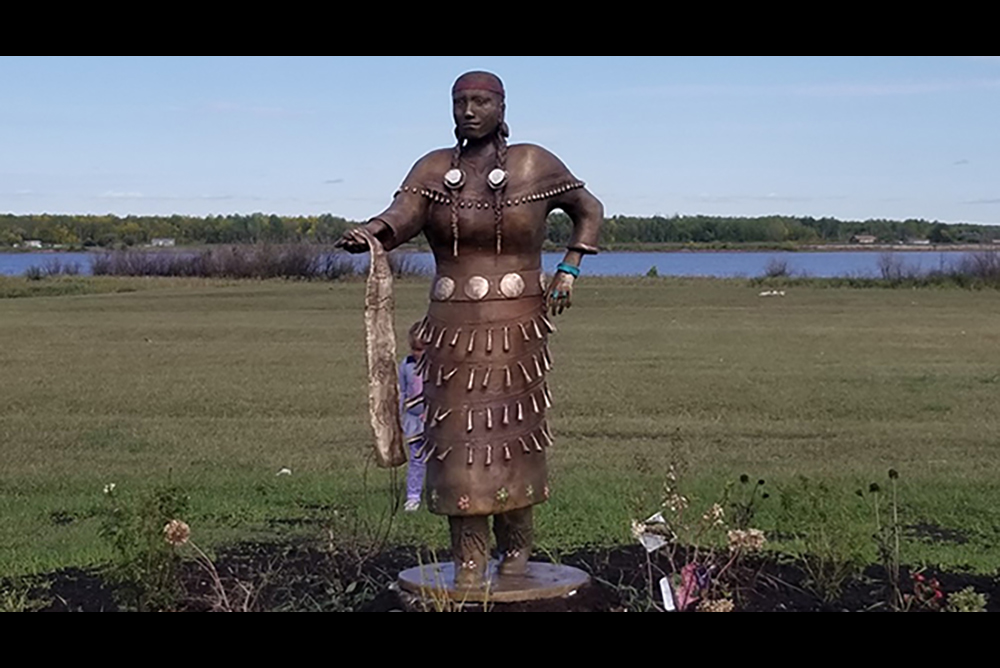 Kakigay-Pimitchy-Yoong Pimatizwin – Sagkeeng First Nation Manitoba- artist Wayne
Stranger
Kakigay-Pimitchy-Yoong Pimatizwin – Sagkeeng First Nation Manitoba- artist Wayne
Stranger
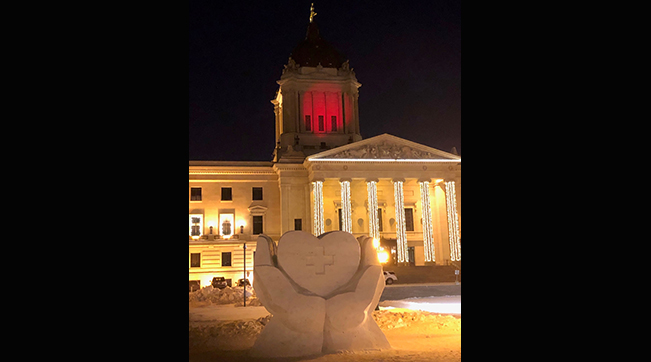 Red lights
lit up on the Legislature Building in honour of MMIWG on February 14th 2021 – the
annual MMIWG march/walk
Red lights
lit up on the Legislature Building in honour of MMIWG on February 14th 2021 – the
annual MMIWG march/walk
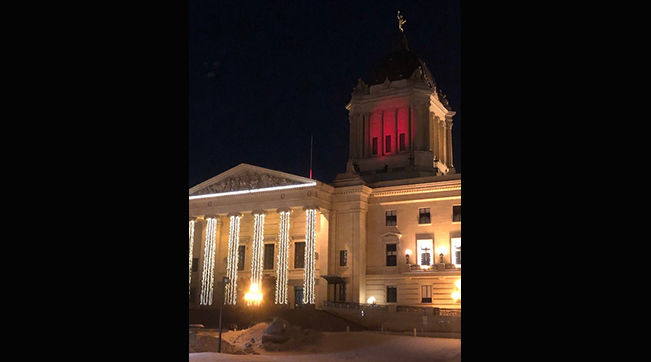 Red
lights lit up on the Legislature Building in honour of MMIWG on February 14th 2021 –
the annual MMIWG march/walk
Red
lights lit up on the Legislature Building in honour of MMIWG on February 14th 2021 –
the annual MMIWG march/walk
